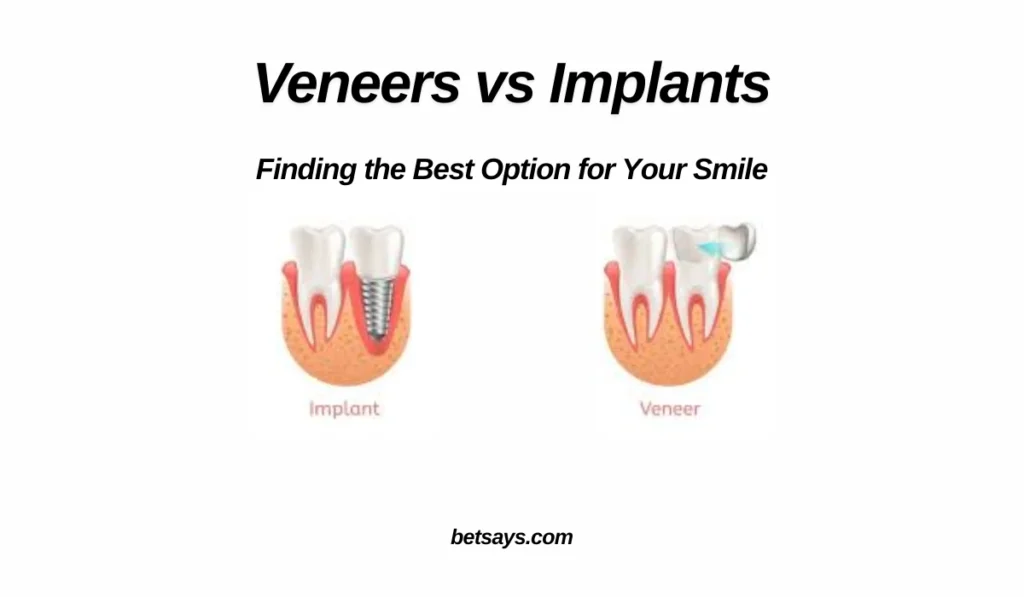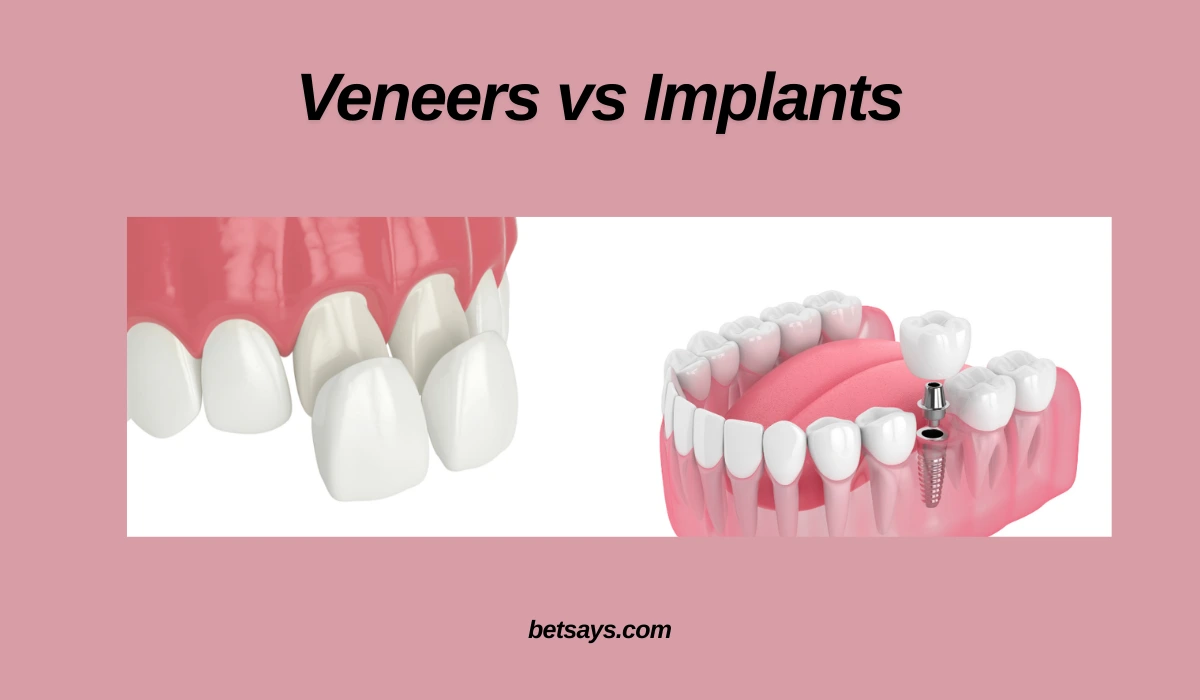Veneers vs Implants: Finding the Best Option for Your Smile
If you’re considering enhancing your smile, Veneers vs Implants might be the two most suitable solutions for your dental needs. Both treatments offer ways to improve aesthetics and functionality, but they are designed for different purposes. Knowing which option is right for you depends on factors such as your dental health, cosmetic goals, and budget.
Understanding Dental Implants
Dental implants are a permanent solution for missing teeth. They consist of a titanium post implanted into the jawbone, which serves as a tooth root. Over several months, the jawbone integrates with the post, creating a sturdy foundation. A crown is then attached to restore the tooth’s appearance and function.
Implants are ideal if you have one or more missing teeth, strong bone support, and healthy gums. They prevent bone loss by stimulating the jawbone, which typically occurs when teeth are missing. Implants look and feel like natural teeth and allow you to eat and speak comfortably without worrying about slipping dentures or temporary replacements.
While dental implants offer durability and long-term value, the process can take several months, involving surgery and healing time. Additionally, implants can be more expensive than veneers, with costs ranging from $3,000 to $4,500 per tooth depending on additional procedures such as bone grafting.
What Are Veneers?
Veneers are thin shells of porcelain or resin that are bonded to the front surface of existing teeth to improve their appearance. They offer a quick solution for teeth that are discolored, chipped, or misaligned.
Who Should Consider Veneers?
- Individuals with cosmetic imperfections, such as:
- Stained or discolored teeth
- Chipped or worn-down teeth
- Misaligned or irregularly shaped teeth
- Small gaps between teeth
Advantages of Veneers
- Quick Transformation: Achieve a new smile within 1–2 dental visits.
- Natural Look: Porcelain veneers mimic the appearance of real teeth.
- Stain Resistance: Porcelain resists staining from food and drinks.
- Minimally Invasive: Requires only a thin layer of enamel removal.
- Boosts Confidence: Provides an even, bright smile that enhances self-esteem.
Potential Drawbacks of Veneers
Limited to Existing Teeth: Veneers cannot replace missing teeth.
Not Permanent: Veneers need to be replaced every 10–15 years.
Costly for Multiple Teeth: Veneers range from $500–$2,500 per tooth.
Fragility: They can chip or crack if not maintained properly.
Irreversible: Once enamel is removed, it cannot be restored.
However, veneers do not replace missing teeth or offer the structural support that implants provide. They usually last between 10 to 15 years with proper care, making them less durable than implants, which can last a lifetime with maintenance. Veneers are also more affordable, ranging from $925 to $2,500 per tooth, but they may need periodic replacement over time.
Read more: Bermuda grass vs st augustine
What Are Dental Implants?
Dental implants are permanent replacements for missing teeth. They consist of a titanium post inserted into the jawbone, which acts as an artificial tooth root. A custom-made crown is placed on top of the post to restore function and aesthetics.
Who Should Consider Dental Implants?
- Missing teeth due to injury or decay
- Strong jawbone to support the implant
- Ability to maintain good oral hygiene and gum health
- Non-smokers (as smoking can hinder healing)
- Willingness to undergo a months-long process
Advantages of Dental Implants
- Permanent Solution: With proper care, implants can last a lifetime.
- Natural Appearance: Implants look and function just like real teeth.
- Improved Comfort: No slipping or discomfort, unlike dentures.
- Preserve Jawbone: Implants prevent bone loss by stimulating the jawbone.
- No Impact on Neighboring Teeth: Unlike bridges, implants do not require alteration of surrounding teeth.
Potential Drawbacks of Implants
- High Cost: Implants cost $3,000–$6,000 per tooth.
- Time-Intensive: The process takes several months to complete.
- Surgical Procedure: There are minor risks, such as infection or nerve damage.
- Requires Good Bone Density: Bone grafts may be necessary for some patients.
Comparing Veneers vs Implants
| Feature | Veneers | Implants |
|---|---|---|
| Purpose | After several months with surgery and healing | Replace missing teeth |
| Procedure Time | 1-2 visits | Several months with surgery and healing |
| Durability | 10-15 years | 20+ years or lifetime with proper care |
| Cost Per Tooth | $925 – $2,500 | $3,000 – $4,500 |
| Functionality | Cosmetic improvement | Restores chewing and speaking ability |
| Invasiveness | Minimally invasive | Involves surgery |
Making the Right Choice: Veneers vs Implants
Choosing between veneers and implants largely depends on your oral health and the results you desire. If your goal is to replace missing teeth, dental implants are the ideal option since they restore both appearance and functionality. Implants are also better for those looking for a long-term investment in oral health, as they prevent bone loss and require minimal maintenance once integrated.
On the other hand, veneers are the go-to solution if your teeth are intact but have cosmetic flaws such as stains, minor misalignment, or chips. They are less invasive and offer a quick smile transformation, perfect for those seeking immediate results.
Key Differences Between Dental Implants and Veneers

| Aspect | Dental Implants | Veneers |
|---|---|---|
| Purpose | Replace missing or severely damaged teeth | Improve the appearance of existing teeth |
| Durability | 20+ years or lifetime | 10–15 years |
| Procedure Type | Surgical (requires implant placement) | Minimally invasive (enamel reshaping) |
| Treatment Time | Several months (with healing) | 1–2 visits |
| Cost | Higher per tooth ($3000–$6000) | Lower per tooth ($500–$2500) |
| Best For | Replacing missing teeth | Correcting cosmetic flaws like chips or stains |
| Maintenance | Similar to natural teeth (brush, floss) | Requires care to avoid cracking |
| Suitability | Requires healthy jawbone and gums | Suitable for most cosmetic needs |
Read more: Nicolette scorsese net worth
Frequently Asked Questions (FAQs)
Are veneers or implants more expensive?
Implants are generally more expensive, costing between $3,000 and $4,500 per tooth, while veneers cost around $925 to $2,500 each but may need replacements over time.
Can veneers fix missing teeth?
No, veneers are used for cosmetic purposes on existing teeth. They cannot replace missing teeth, which is why implants are recommended for that purpose.
How long do veneers last?
With good care, veneers typically last between 10 to 15 years. However, they may need to be replaced if they chip or become worn over time.
Do implants require special care?
No, implants require the same care as natural teeth, including brushing, flossing, and regular dental visits. With proper hygiene, implants can last a lifetime.
Conclusion
Both Veneers vs Implants offer excellent solutions for improving your smile, but their suitability depends on your specific needs. If you’re looking to replace a missing tooth permanently, implants are the way to go. They offer a long-term, functional solution that supports oral health. However, if your teeth are structurally sound and you only want to improve their appearance, veneers provide a faster, less invasive alternative.
Consult your dentist to determine the best course of action based on your oral health and aesthetic goals. Each case is unique, and a professional consultation will ensure you choose the right option for a beautiful and lasting smile.







